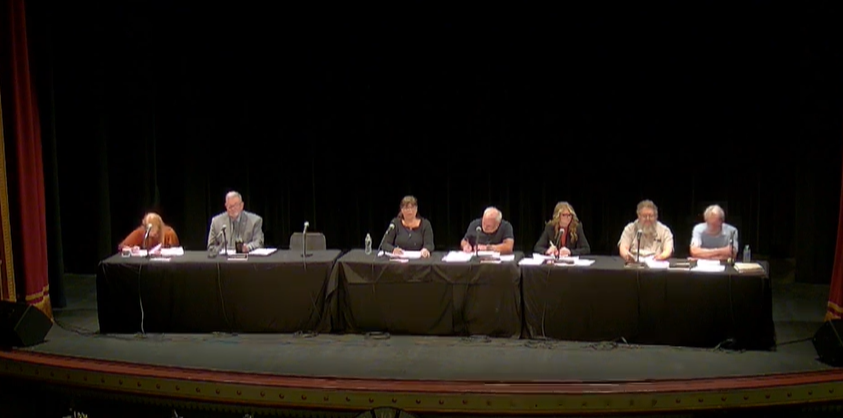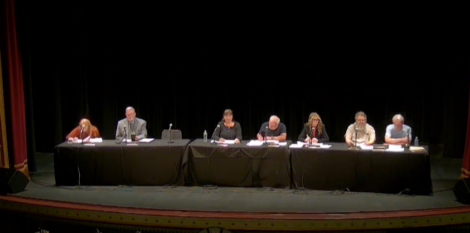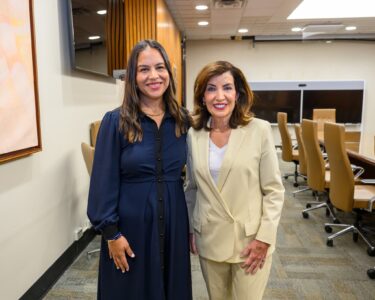Fredonia OKs water purchasing

Wednesday's Fredonia Village Board meeting took place at the Opera House.
Fredonia will seek to buy water from the North County Water District, decommission its treatment plant and reservoir, and share a new tank with the town of Pomfret, after a 4-1 vote by the Board of Trustees Wednesday.
The voting on the plan went along the expected lines: Trustees Ben Brauchler, Jon Espersen, Nicole Siracuse and Paul Wandel voted “aye.” Trustee Michelle Twichell provided the “nay” vote.
The meeting was moved to the Opera House in anticipation of a larger than normal crowd, which happened — about 40 residents. There was a heavy presence from “Save Our Reservoir,” the Fredonians who want the village to keep producing its own water.
Village officials listened to slightly more than an hour of mostly negative comments about the plan to look elsewhere for water. One man did threaten to sell his business if the village kept and repaired its current reservoir and plant, claiming it would result in the highest water prices in the country.
“Save Our Reservoir” stalwarts Andrew Ludwig, James Lynden, Sam Drayo and Mark Twichell were among those to thunder against the plan. Ludwig occasionally shouted comments from the audience, irritating Mayor Michael Ferguson so much that at one point he threatened to end the meeting.
Jessica Wuerstle, director of the environmental health division of the Chautauqua County Health Department, attempted to defend the department’s activities regarding the village’s water system. “We can’t answer questions that were never asked,” she noted.
Wuerstle also read a Health Department letter supporting the plan, mentioning numerous deficiencies at the treatment plant.
When it was finally time to vote, Brauchler had the first word.
He said he wished the village could fix its own water system and also buy water from the North County Water District. However, “it’s unrealistic to fix our water supply while we have no existing water supply and we sit here one harmful algal bloom away from not a boil water notice, but a ‘don’t use the water for any purpose’ notice. Dunkirk’s treatment plant can deal with harmful algal blooms, whereas our treatment plant cannot.”
Espersen voted yes without commenting.
Siracuse referenced a permissive referendum attached to a resolution to bond for the plan. Village residents will have to petition for a public vote if they want a direct say in the decision.
Siracuse said a petition for a referendum on change.org had 192 signatures. “Former mayor (Athanasia) Landis stated that a petition that she is aware of was around 300 signatures,” Siracuse added.
Espersen interrupted to bark at someone in the crowd, “You know what, let her talk! We didn’t interrupt you guys when you were speaking. Let her talk!”
“Out of the 4,000 registered voters of Fredonia, that is not nearly the number that you need to force a public referendum or permissive referendum. That also does not clearly represent the population of the village,” Siracuse continued. “My vote tonight is based on the fact that the capital costs for one project, option 2, is less than the capital costs for option 1 (keeping and repairing the reservoir).
“We are also more likely to get grant funding for option 2 as opposed to option 1. In fact, we were told by grant writers (and) engineering firms that it was highly unlikely we would receive grant funding for option 1 because it would be largely looked at as a maintenance project — because these were things that we should have been doing over the lifespan of the water treatment plant.”
There is a 3% projected yearly increase for water costs under option 2, Siracuse said, while since 2020, the village’s water rate has gone up 37% while going it alone.
“This project, no matter what it is, is going to take years and improvements need to be made in the meantime,” she continued. “However, there are significant improvements that will be cost prohibitive if possible at all, and that is increasing the capacity of the reservoir. … We also don’t know that that would even be enough to increase the capacity to meet Health Department standards.
“If we were to go with our own water treatment plant that means spending at least $35 million every 25 to 30 years. We wouldn’t even be done paying for this project before we had to start the next one.”
Espersen raised his voice again at someone in the crowd. “Just because you don’t like what my answer is, does not mean I am not answering your questions,” said Siracuse. “I’m not a water expert and I am not a grant expert. I’m choosing to heed the advice of the experts in their fields, and so with that, my vote is yes.”
“Save Our Reservoir” members yelled their disgust. “If you have 1,030 votes, you can force a referendum,” said Brauchler. “You need 1,030, get to work. They need to be registered voters.”
Wandel read a lengthy statement. He said in part, “Fundamentally, this is about change. Big change. And change is typically not easily accepted or assimilated. I understand this. We need decisions that are governed by long term planning and vision, along with partnerships, collaborations, and intermunicipal agreements. Silo mentalities and independent standalone paradigms are no longer sustainable. Our very survival as a village is dependent on these ideas, I believe.
“The benefits will be a safe, reliable stream of quality water to service all village residents and industries.”
Twichell said, “I believe LaBella didn’t look into that. We supply eight or nine districts with water. We would be able to get grants because of that, and they never did look into that. I don’t know why we would want to give away our reservoir and just rely on Dunkirk. There’s many issues with Lake Erie water — not that it’s not safe, but if something were to happen, who do you think would be without water? They would consider Dunkirk first… Fredonia would be left with whatever they deem necessary.”




